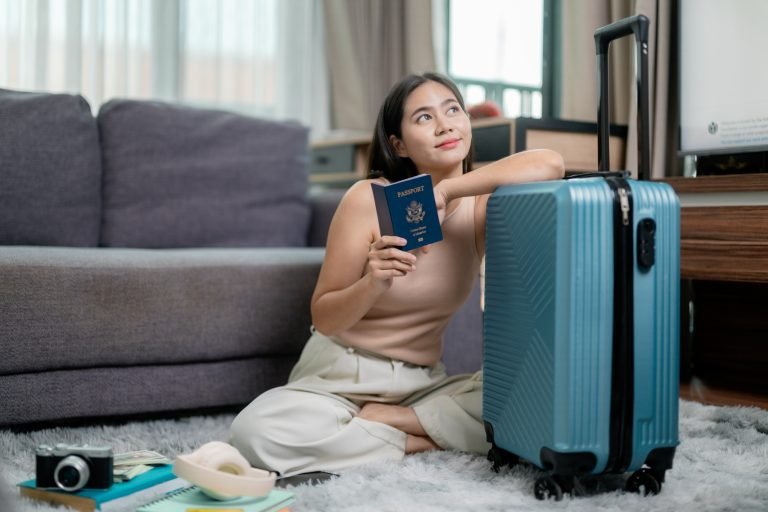The date is set: The place you’ve called home for this life chapter now has a deadline, and you’re just counting down the days before your lease expires.
As bittersweet as it is to leave behind your old home, life goes on. Whether you’re a digital nomad moving to your next destination, an international student returning to your home base, or an expat switching jobs, it’s important to take the right steps to ensure the transition to your new life proceeds smoothly.
That said, you can’t just lock the doors of your old house and head on your merry way. You should follow the right protocols to ensure that everything, from your belongings to your old house’s utilities, is properly sorted out. This way, you can depart your place without having to deal with a backlog of unfinished tasks or a frustrated landlord breathing down your neck.
It doesn’t matter if you’re already miles away—what matters is handling the moving process with a proper strategy in place. Without further ado, here’s everything you need to know about moving out of your old home abroad and transitioning smoothly.
- Notify Relevant Parties About The Move
Before you initiate any move, you should inform key people and companies about your plans to move.
The first person you should contact is your landlord. They would need ample time to process the move on their end, so formalising your moving plans with them can help them make the necessary preparations to prepare the space for the next tenant. A 30-day notice (or longer) gives them enough time to react appropriately.
If you’re responsible for utilities, then you should also notify utility providers about your upcoming move. More specifically, contact the electricity company, gas company, internet provider, and post office about your intended transfer so that they can terminate their services. This will help your final billing to stay within the bounds of your stay and not beyond it.
Furthermore, if you have any connections with the community, whether you’re volunteering or employed under a local company, then make sure that these folks are in the loop as well. This way, they can allocate resources more efficiently or initiate a hiring process early on and not need to scramble for a suitable replacement.
- Declutter Your Belongings
The next step when leaving your home abroad is to trim down what you don’t need.
If you’re moving out of a temporary housing unit, then you likely don’t have a lot of useful belongings to bring along with you. In such cases, you don’t have to do much more than put your belongings in a box or sack and remove them from the premises.
However, if you have more items than you can deal with in an afternoon, then you have to be systematic about the process. Start by sorting your belongings into one of four categories: keep, sell, donate, and dispose. Try to adopt a mindset to throw or donate more than you can keep.
Ideally, you should start selling or donating your belongings weeks before moving day. You can sell your items through online marketplaces like Facebook Marketplace to lighten your load while getting a quick buck out of it. When disposing of waste, make sure to segregate it properly to ensure that you’re throwing it responsibly.
Hiring an interstate removalist service like Muval can be worth considering if you want to hire an all-in-one service that disposes of rubbish responsibly and moves furniture to your new home in Australia for you.
- Prepare a First-Week Bag
If you have just left your overseas house, it’s important to have a backup bag to ensure that you can easily settle into your new space. This bag should contain everything you would need upon first arriving at your new space, whether it’s a temporary accommodation or your new home.
The bag should include a set of clothes, toiletries, medications, paperwork, travel documents, chargers, and other relevant paperwork. If you have kids, make sure that their immediate needs are accounted for as well.
A first-week bag allows you to settle in more comfortably in your new space without having to unload your boxes. Moving can be stressful enough, so having the essentials on hand can be a good way to eliminate the hassle of digging through your luggage.
- Follow Your Landlord’s Move-Out Instructions
When leaving your home abroad, you should familiarise yourself with and follow the move-out procedures that have been outlined in your lease contract.
These instructions are there to ensure that you (and other tenants) don’t leave the apartment in poor condition by the time your lease ends.
Typically, instructions would include things like cleaning the space before moving out, removing all personal belongings, and repairing any broken appliances that come with the unit, such as lightbulbs.
Each landlord and property has a different set of rules regarding how they operate. If you want to have a smooth move-out process with no fines, disputes, or deductions in your deposit, then follow these instructions and return the unit in good condition. You and your landlord will be on good terms because of it.
- Conduct a Thorough Inspection
Before you leave your house, make sure that you’ve accounted for every nook and cranny in the house. You don’t want to leave behind valuable things when you lock the door and leave for good.
Common culprits for lost items include fixed storage units like cabinets and closets. Bed frames and unused rooms may also contain some random personal items you should bring with you.
Besides rummaging for your items, be sure to check if everything is in working order. This includes power sockets, smoke alarms, light fixtures, and more. Document everything with photos to give you visual proof when showing to your landlord. And if there’s anything broken, then prioritise fixing it.
Being meticulous ensures that you won’t be hassled by your landlord once your lease ends and that you can get your full security deposit.
- Update or Redirect Your Address
Another crucial must-do activity is to update your address across different essential services.
In some cases, like with the local post office, you will have to cancel these services completely as you’ll be based in another country. Failing to do so can lead to a build-up of mail in your mailbox and missed packages.
First, start by informing your local post office about the move. They can set up a mail forwarding scheme for packages and mail that get sent to your old address.
Besides the post office, let the bank, insurance provider, and relevant government agencies know about your upcoming move. Update eCommerce platforms and subscriptions with your new address, too. You should also update your records with the embassy if the move is permanent.
By updating your address, you’ll more easily transition into your new life as nothing gets overlooked or mistakenly left behind.
- Make Sure Finances and Documents are Sorted Out
Before leaving your home abroad, it’s critical to ensure that your finances and documents are all accounted for. The last thing you’d want to happen is missing out on getting crucial documents on the day of the move.
Start by settling any outstanding debts or bills tied to your overseas residence. This includes (but isn’t limited to) rent, utilities, internet, and subscription services.
Next, update your bank with your new address. Ensure that your bank is notified about the move and that the accounts are accessible internationally (or if you wish to close them, then you may do so as well). It’s also wise to notify your credit card company of your move to prevent any security issues.
Another thing to keep in mind is to gather all critical documents and put them in one central location. Examples of these important documents include your passport, visa, rental agreements, insurance policies, and medical records.
Create digital copies of these documents to ensure you can show them in case you lose the original copies for whatever reason. By staying organised, you’ll face a lot less stress once you’ve physically relocated.
We hope these tips will serve you well in your upcoming move. Best of luck!


































